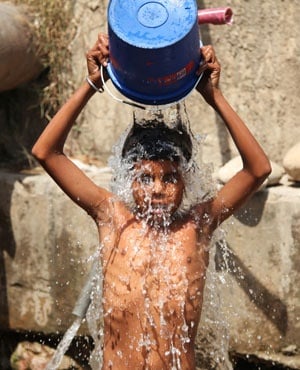
SUMMER is here and in South Africa we’re especially blessed with many long days of brilliant sunshine. But being exposed to the season’s heat at work or play can take its toll on your health. We’ve got some tips on how to cope with the rising temperatures.
DEHYDRATION
If your body loses more fluid through perspiration than you take in, you stand the risk of becoming dehydrated, a condition that prevents your body from functioning properly. The signs of dehydration include a dry and sticky mouth, decreased urination, headaches, thirst, dry skin, tiredness, diarrhoea, constipation and dizziness. Mild or moderate cases are usually fixed by drinking fluids – especially water – but in more severe instances medical treatment may be required.
SUNBURN
Getting a painful sunburn is probably the most common summer problem for those of us with more delicate skin who spend a lot of time outdoors. While sunlight is beneficial (its plays an important role in the production of essential vitamin D), the ultraviolet (or UV) rays contained in it can do damage to the skin, causing burns and skin cancer. Luckily, protecting yourself against these dangers is quite straight forward:
¯ Stay out of the glare of the full sun, especially between 10am and 4pm, by sticking to the shade and covering exposed areas of skin with clothing. A broad-brimmed hat is highly recommended.
¯ Half an hour before going outside, apply a sun cream with a sun protection factor (SPF) of at least 30 and reapply it at regular intervals. This is particularly important for children and when you are spending time in the water, for example at the pool or the beach. Look for a sun cream that is effective against both UVA and UVB rays.
¯ Protect your eyes with a good pair of UV-blocking sunglasses.
¯ Some studies suggest that certain vitamins, including vitamins C, E, D and A can help reduce the skin damaging effects of sunlight, so speak to your pharmacists about an appropriate supplement.
HEATSTROKE
The most serious effect of prolonged exposure to elevated temperatures and the sun is a life-threatening medical emergency known as heatstroke or sunstroke in which the body is no longer able to regain its normal operating temperature. Doctors define heatstroke as a condition in which the core body temperature rises to above 41 degrees Celsius. Common symptoms include a rapid heartbeat, rapid or shallow breathing, hot, dry skin, dilated pupils, dark urine, painful muscle cramps and spasms, nausea and vomiting, throbbing headaches, confusion, incoherent speech, seizures and fainting. Heatstroke can result in serious damage to the brain and other internal organs. If you suspect someone is suffering from it, it is important to call for emergency medical assistance without delay.
STEPS TO TAKE IN AN EMERGENCY
While you wait for help to arrive, you should:
¯ Move the person to a cool area out of the sun and ask them to lie down;
¯ Remove any unnecessary items of clothing and cool the person down by fanning them with air, wetting their skin with water, applying ice packs or cold compresses to their armpits, groin, neck and back, or covering them with wet sheets or towels;
¯ Get them to take a cool shower or bath;
¯ Ask them to drink some water, juice or a sports drink.
STAYING CHILLED DESPITE THE SUMMER HEAT
Climate scientists tell us that extreme heat waves are likely to increase in intensity and frequency as a result of global warming during the decades to come. Such events can be surprisingly dangerous, claiming thousands of lives around the world every year. Staying out of the sun during the hottest parts of the day and keeping hydrated by drinking lots of fluids are probably the most effective strategies for managing comfort levels on sunny days, but there are many other tricks you can try. ?Slow down. Operating in a lower gear than normal prevents your system from overheating.
? Wear comfortable, loose-fitting clothes made of light, breathable materials.
? Fill a small spray bottle with water, keep it in your fridge and mist yourself with a few refreshing spritzes whenever you’re feeling hot and bothered.
? Eat spicy food. This might come as a bit of a surprise, but the ‘heat’ of the food will make you sweat and sweating is the body’s natural mechanism for cooling itself down. Avoid baked and fried goods as well as large meals that are rich in protein, sugar and fat. They will raise your metabolic rate and heat up your body.
? Keep the inside of your home cooler for longer by opening doors and windows in the early morning and evening, but pulling the curtains when the sun’s out. Use fans to promote a cooling airflow throughout the day.
? Drink fruit juice or sports drinks to replace the salt and electrolytes your body is losing through sweating. Limit your consumption of sweet cooldrinks, caffeine and alcohol, all of which have dehydrating effects.
? Keeping hydrated doesn’t only mean drinking plenty of fluids but can be supplemented by eating foods with a high water content such as cucumbers, watermelon, tomatoes and grapes.
? Make a cold compress by dampening a washcloth and placing it in the freezer for a while before applying it to your wrists, ankles, elbows, groin, neck, forehead and the back of your knees. Simply immersing your wrists or feet in a basin of cold water every now and then will also do the trick.
? If a little bit of moisture doesn’t bother you when you go to sleep, dampen a sheet with water and use it as a cooling blanket at night.


















